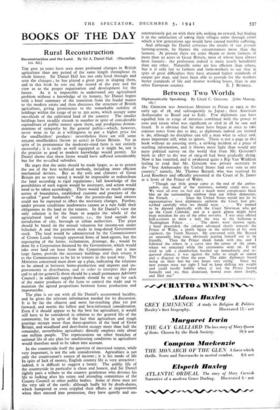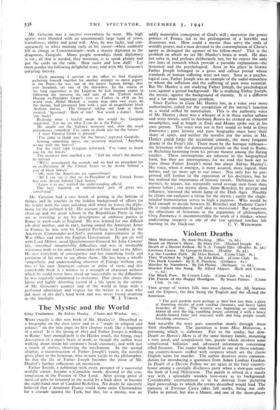Between Two Worlds
MR. GIUSCOM was American Minister to Persia in 1905 at the early age of 28, and subsequently to Japan ; then American Ambassador to Brazil and to Italy. Few diplomats can have equalled him in range of interests combined with the power to note and retain what was significant or vital in all he saw and heard. It is obvious that he must have begun at once to take copious notes from day to day, as diplomats indeed are trained tc do, although no discipline can tell a man what to select and, more important still, what to ignore. There is not a page in this book without an amusing story, a striking incident or a piece of startling information, and it throws more light than would any mere political survey on the world that from Mr. Griscom's birth in 1877 to the war of 1914-18 had been gradually dying. Now it has vanished, and it awakened quite a Rip Van Winklish feeling to read that Mr. Griscom was private secretary to the "first Ambassador the United States had ever sent to any country," namely, Mr. Thomas Bayard, who was received by Lord Rosebery and officially presented at the Court of St. James at a levee of the Prince of Wales.
"Though our little group came at the end of the ambas- sadors, just ahead of the ministers, nobody could miss us. We were all over six feet and a much more conspicuous black blot on the surrounding rainbow than our fellow democrats, the French. . . . Since the United States would not let its representatives have diplomatic uniform the Court had pre- scribed carefully what we should wear. . . . We seemed to be dressed identically with the Court Newsman who got up the Court Calendar, and at a quick glance might have been mistaken for any of the other servants. I was once offered half-a-crown to show a lady the way to the ballroom at Buckingham Palace. . . . The doors were thrown open, a head descended, the column advanced slowly towards the Prince of Wales, a portly figure in the uniform of his own regiment, the Tenth Hussars. He conversed with Mr. Bayard an unusually long time, obviously putting himself out to be
friendly. Then the Prince shook hands with me, and I followed the others in a curve into the center of the room, where we remained while the ceremonies went on. H we tried to talk a chamberlain bustled up immediately and re- quested silence; it was against the rules to cough or sneeze and a disgrace to blow the nose. The elder diplomats found being on their feet for two hours very trying. Since my new pumps were too tight I had to keep shifting my weight and could hardly hobble when at last the Prince bowed formally and we, thus dismissed, bowed even more deeply, and filed out."
Mr. Griscom was a success everywhere he went. His high spirits were blended with an uncommonly large fund of sense, friendliness, ability and good will. Also, he was lucky, and con- spicuously so when meeting early in his career—when suddenly left in charge at Constantinople—with a master diplomat in the dragoman, Gargiulo. Many people nowadays think diplomacy is rot ; all that is needed, they maintain, is to speak plainly and put the cards on the table. How naive and how dull! Let them ponder the following delightful story, told with Mr. Griscom's unfailing brevity.
"Each morning I arrived at the office to find Gargiulo gathering himself together for another attempt to move papers at the Porte—he was one of the laziest human beings that ever breathed, yet one of the shrewdest. In the course of his long experience at the Legation he had become expert in following the tortuous ins and outs of the Turkish mind. During ex-President Grant's visit to Turkey in 1878 on his world tour, Abdul Hamid, a young man only two years on the throne, had presented him with a pair of magnificent black
Arabian horses. The General, taking one look at them, snorted, Spavined! Both of 'em! Not worth a damn! Send 'em back! '
Realising what a fearful insult this would be, Gargiulo suggested, Let me see what I can do at the Palace.'
He sought out the Sultan's secretary and, after the usual politenesses, remarked 'I've come to thank you for the horses.' I trust General Grant is pleased.' I've come to thank you for the horses,' repeated Gargiulo. Sensing something amiss, the secretary inquired, 'Anything wrong with the horson? '
For the third time Gargiulo reiterated, I've come to thank you fot the hones.' The secretary now smelled a rat. 'Tell me what's the matter,' he insisted.
We've :nvestigated the records and we find no precedent for an ex-President of the United States to be drawn behind a pair of black horses.' Oh, then the Americans are superstitious? All I can say is that no ex-President of the United States has ever driven behind Llack horses.'
Leave it to me,' replied the understanding official.
The next morning an unblemished pair of grays was substituted.".
Mr. Griscom had a rare knack of getting at the bottom of things, and he touches in the hidden background of affairs for the reader with the same unfailing skill when he leaves the diplo- matic for the political fizId. His account of the Roosevelt-Hughes clean-up and the great schism in the Republican Party in 1912 are as revealing as are his descriptions of embassy parties in Rome or week-ends in England. He was wanted for one difficult job after another, and in 1917, having joined the American Army in France, he was sent by General Pershing to London as the American Commander-in-Chief's personal representative at the War Office and with the English Government. He got on well with Lord Milner, saved Quartermaster-General Sir John Cowans' life, smoothed innumerable difficulties and was of invaluable assistance both to his own Commander-in-Chief and to the Allies. He met everybody of consequence and has something lively and pertinent of his own to say about them. He has been a wholly sympathetic and understanding observer of Europe without any loss to his own American culture or point of view, and this remarkable book is a witness to a strength of character without which he could never have stood up successfully to the difficulties he was regularly summoned to overcome. One closes this stimu- lating and highly diverting record of a life spent in the service of Mr. Griscom's country and of the world at large with a profound admiration and respect for the writer as a man who did most of the day's hard work and was never found strutting























 Previous page
Previous page